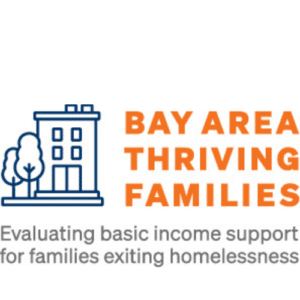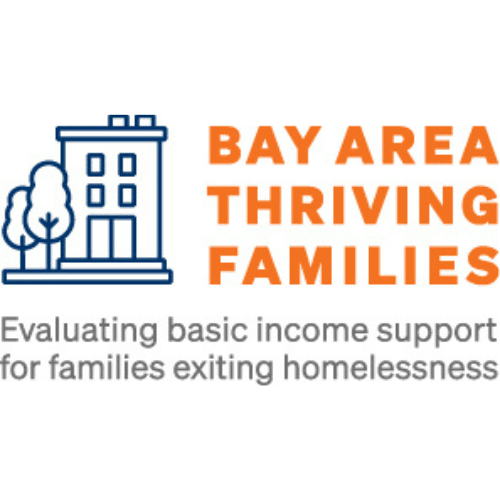
Overview
The Housing Solutions Lab has partnered with Compass Family Services and Hamilton Families, two San Francisco-based providers of rapid rehousing services, to launch Bay Area Thriving Families, an evaluation of basic income support for families who have experienced homelessness. Through this partnership, we will test whether unconditional cash payments to families leaving rapid rehousing programs can help them achieve long-term housing stability. While a growing body of evidence suggests unconditional cash payments are an effective and cost-efficient tool for alleviating the strains of poverty, Bay Area Thriving Families will be among the first studies to evaluate their effectiveness as a tool to address homelessness. We hope our findings will be valuable for researchers, policymakers, and community providers of homeless services who may wish to supplement existing services with direct cash payments.
Background
Rapid rehousing is an increasingly widespread form of homeless assistance program that provides temporary housing subsidies for individuals and families experiencing homelessness (typically for 18-24 months), as well as housing search assistance and case management. While rapid rehousing services can provide critical short-term support to families experiencing homelessness, many cannot maintain their housing when the subsidies end and others face unsustainably high rent burdens, often relocating to housing far from their home communities.
The goal of Bay Area Thriving Families is to examine if unconditional cash payments that start as families prepare to exit rapid rehousing can help them overcome these challenges. Numerous studies in the developing world find that unconditional cash transfers are effective at alleviating poverty, improving physical and mental health, and encouraging savings and human capital investments. Despite common stereotypes, cash transfers do not cause recipients to work less or increase their spending on drugs and alcohol.
Based on these promising results, a growing number of studies have begun to assess the viability of direct cash payments for poverty alleviation in the United States, although most are still in their early stages. One exception is Stockton’s SEED program, which provides $500 per month for 24 months to 125 households below the Area Median Income (AMI). In its first year, researchers found an increase in full-time employment and in measures of physical and mental health. Only a handful of existing studies seek to evaluate direct cash transfers for preventing homelessness and improving housing stability, and no existing studies assess their potential to aid families exiting rapid rehousing in achieving longer-term housing stability.
Study design
Bay Area Thriving Families will use a randomized control trial methodology to evaluate the effects of the cash transfers. In the study, we will enroll 450 families with children in Compass or Hamilton’s rapid rehousing programs. Families that agree to participate will be randomly selected to receive $1,000 per month for 12 months or $50 per month for 12 months. Randomized control trials are the gold standard in policy evaluation, and random assignment ensures that any differences in outcomes are due to the cash payments, not pre-existing differences between the groups.
Payments will begin one to three months before families exit rapid rehousing. Working with a payment vendor, we will set up a bank account for each family, and payments will be made automatically into this account monthly. Families will be able to access the funds using a debit card or make transfers to other accounts. Participants have no rules, limitations, or expectations for using these funds, and are not required to report how or when they use them.
We will employ a combination of administrative data sources and surveys to assess the effect of the cash payments on housing stability, returns to homelessness, and rent burden in the year after the payments end. We will also assess the effect of the payments on employment, investment in education or training, income, savings, debt, food security, health, and psychological well-being.
Research contributions
Thriving Families aims to provide more insight into how leaving a housing subsidy program can be eased with basic income support. Modest cash payments that continue after short-term rental subsidies end may provide a soft landing for families exiting rapid rehousing, enabling them to achieve longer-term housing stability. More specifically, this study aims to answer the following questions:
- What is the effect of the cash transfers on returns to homelessness, housing stability, and rent burden after the cash transfers end? We hypothesize that offering cash assistance as families exit rapid rehousing programs will ease their transition away from rental subsidies, allowing them to attain longer-term housing stability.
- Do the effects of the cash transfers persist over time? Will families be stably housed not only while receiving income support but also 12 months after cash payments cease?
- What are the mechanisms through which cash transfers affect housing outcomes? This is one of the richest potential sources of information from this evaluation. Cash transfers may enable participants to find better jobs by meeting basic needs during their job search or invest in education and training programs. The transfers may also allow parents to cover childcare expenses, increasing their flexibility to work. Another possibility is that cash transfers will improve families’ financial well-being by allowing them to pay down debt or build savings. Finally, cash transfers may improve psychological well-being, lower stress, or increase self-efficacy. This may translate into improved labor market outcomes or higher income.
- What is the effect of cash transfers on the well-being of families? The cash transfers may directly or indirectly improve the physical and mental health of participants and their children. The transfers may also enable participants to purchase more or higher quality food, improving both their health and their children’s. The extra funds may also reduce stress surrounding their housing and financial situation. Transfers may also improve their sense of self-efficacy by enabling participants to find better jobs or resolve financial challenges. Reductions in stress, anxiety, and emotional distress may, in turn, improve physical health.
Policy implementation contributions
Finally, the Thriving Families team hopes to use learnings from the study to develop best practices and recommendations for implementing and designing cash transfer programs to improve housing stability. The Housing Solutions Lab’s implementation partners, Compass and Hamilton, have been key partners in the development and design of the intervention and will continue to play a vital role throughout the study. Compass and Hamilton staff, along with the Lab’s research team, worked closely for more than a year to plan all aspects of the evaluation. In tandem, the team will develop process recommendations for other homeless service providers or policymakers who hope to implement a cash transfer program in the future.
If you have any questions about the study, Ask the Lab.
This study was made possible with grant support from Google.org Charitable Giving and the Abdul Latif Jameel Poverty Action Lab (J-PAL) to evaluate the impact of cash transfers on housing. We would also like to thank J-PAL for their considerable guidance in setting up this evaluation.
